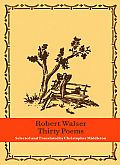 In February we considered the poetry of Georg Trakl on the occasion of several new translations of his work. Now another door opens on this literary moment with Christopher Middleton’s Thirty Poems of Robert Walser, including this tribute to Trakl (first published in Michael Schmidt’s indispensable PN Review).
In February we considered the poetry of Georg Trakl on the occasion of several new translations of his work. Now another door opens on this literary moment with Christopher Middleton’s Thirty Poems of Robert Walser, including this tribute to Trakl (first published in Michael Schmidt’s indispensable PN Review).
Walser, whose growing recognition in English owes much to Middleton’s long efforts, definitely belongs to the same aesthetic family as Trakl (Hölderlin, Musil, Sebald), but in this homage we feel friction of two divergent sensibilities. Walser cut a meek and uncertain figure in life, and his literary output bears many traces of self-erasure. J. M. Coetzee quotes Walser’s signature character, Jakob von Gunten, by way of portraiture: “How fortunate I am not to be able to see in myself anything worth respecting and watching! To be small and to stay small.” Trakl by contrast was a character of vivid colors and bold visions.
And yet later, in “Kleist in Thun,” a story especially loved by Susan Sontag (in her day a lonely enthusiast of Walser), Walser imagines Kleist tearing up his manuscripts, wanting something “new, wilder, more beautiful,” wanting “to abandon himself entirely to the catastrophe of being a poet,” a state indeed close to the one Trakl constantly inhabited. And here Walser is consoled by the luminous Trakl and considers shared madness (with Hölderlin) a source of solace and protection.
TO GEORG TRAKL
In a foreign country I might be reading you
or just as well at home
and your verses were a pleasure to me always;
definitely in the room,
round me the radiance, the shimmer
of marvelous expressions you had found,
never once was any thought of mine forlorn.
A clinging mantle seemed to clothe me
there, in the abyss of reading,
intent upon the beauty of your being,
which is the swan, the boat, the garden
and the atmospheres they too dispense
as up they float, you, opulent
with leaves, ineffably soul, lissome oak,
tumbled rock, whisk of a mouse’s tail,
a little girl, her dancing, yours, dejected giant,
here on a meadow in the Jura where
in play, as if I dreamed it, I propose
this address to your genius.
Did some perpetuation of the fate
of Hölderlin reverberate around your cradle
and keeping you company, as life went on,
doom you at last to golden lunacy?
Your poems, when I read them, more and more
carry me away as in a splendid coach and four.
Translated by Christopher Middleton
G 336. February 1928
 From Thirty Poems by Robert Walser, translated by Christopher Middleton. The design is based on the original Swiss and German editions of Walser’s poems and the book is illustrated with manuscripts and other early documents.
From Thirty Poems by Robert Walser, translated by Christopher Middleton. The design is based on the original Swiss and German editions of Walser’s poems and the book is illustrated with manuscripts and other early documents.
Susan Sontag’s introduction to Walser appears in NYRB’s reissue of Walser’s Selected Stories
Read J. M. Coetzee on Walser here
W. G. Sebald contributed an introduction to The Tanners
A reissue of Walser’s The Walk appeared as a New Directions Pearl a few weeks ago. In 2010 New Directions also published a ravishing edition of selected “Miscroscripts,” late stories only posthumously deciphered from Walser’s tiny, cryptic handwriting, with facsimiles of manuscript pages.
Song of the Departed: Selected Poems of Georg Trakl, translated by Robert Firmage, recently appeared in paperback.
Reprinted by permission of New Directions and Christine Burgin, all rights reserved